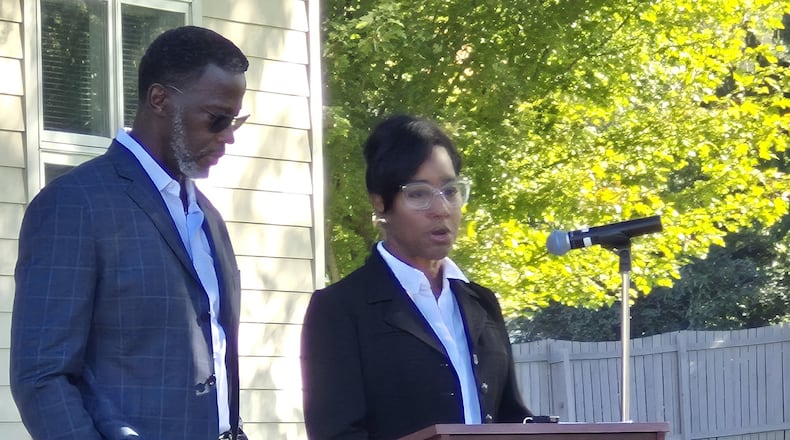“They’re no longer kids but they’re not quite adults,” said Dr. Kelly Blankenship, associate chief medical officer of mental health at Dayton Children’s Hospital and the driving force behind the program. “There’s not one entity that can provide the care that these students need.”
Blankenship said college students are too old for child mental health services, such as those offered by Dayton Children’s, but are too young for full-on adult care.
As a result, they are bounced back and forth between mental health care providers who typically serve one segment or the other.
The program is something University of Dayton men’s basketball coach Anthony Grant and his wife, Chris, said they wish was available in 2022 when they lost their daughter, Jayda, to suicide.
“We discovered there were gaps in the services available,” Anthony said during during a launch celebration for the program on Friday. “Seeing this (collaboration), it’s heartwarming and it’s also gut-wrenching.”
Chris Grant, who has become an advocate for mental health and now sits on the board of directors for the Ohio Suicide Prevention Foundation, said the program’s whole community involvement approach is what’s needed.
“(Students) will not have to carry whatever burden they are carrying alone,” she said.
Kettering Health, Premier Health, the University of Dayton, Wright State University, Kettering College and Sinclair Community College make up the collaborative in addition to Dayton Children’s.
The CA IOP is available to undergraduate college students age 18-24 from any university who are experiencing moderate to severe symptoms of behavioral health that are impacting their ability to function on a day-to-day basis.
Students can self-refer or be referred to the program by emergency centers, university counseling centers, inpatient facilities or community mental health agencies. Dayton Children’s Hospital provides a mental health clinician to Kettering Health through a lease program. The referring academic institution ensures a smooth transition back into school upon discharge from the program.
Brochures detailing program benefits and how to access it will be available at all participating colleges and universities.
The program is billed to insurance.
Kettering Health owns and manages the program. Treatments will be at the Kettering Health Behavioral Medical Center, 5450 Lamme Road, in Moraine.
The program begins accepting applicants Oct. 20.
College Mental Health by the numbers
71% of college students in 2023 experienced mental health issues.
86% of college students have felt overwhelmed.
30% of college students have felt too depressed to function.
6.6% of college students have seriously considered suicide.
Sources: 2023 Gallup poll of undergraduate students, American College Health Association National College Assessment.
About the Author



